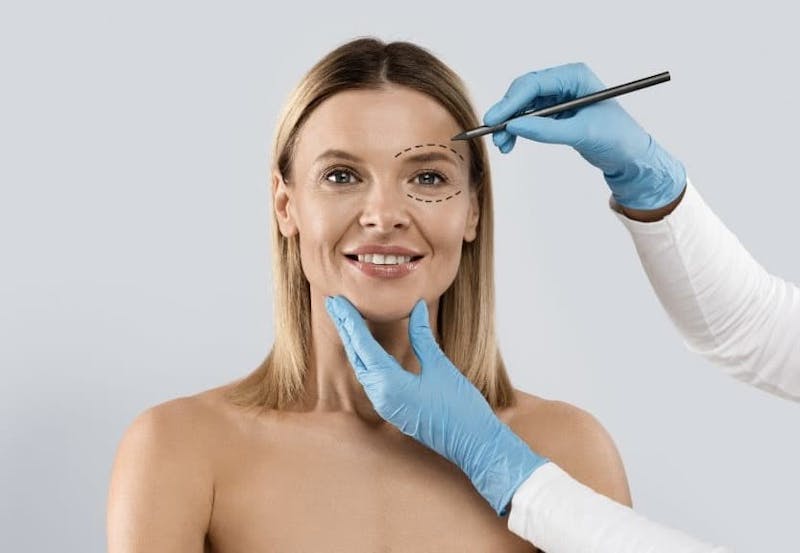
In the world of cosmetic procedures, understanding insurance coverage can be a confusing challenge. When it comes to eyelid surgery, or blepharoplasty, deciphering whether insurance will pick up the tab adds an extra layer of complexity.
We will try to shed some light on the factors that determine eligibility and mention useful insights to help understand will insurance pay for droopy eyelid surgery or eyelid lifts.
What is Blepharoplasty Surgery?
Eyelid surgery can be like a mini makeover for your eyes. This procedure smooths out wrinkles, removes excess skin, assists droopy eyelids, and reduces puffiness around the eyes.
With just a few small incisions, your eyes can appear brighter, more youthful, and rejuvenated. It’s a quick and effective way to refresh your appearance and boost your confidence, leaving you looking and feeling your best with minimal downtime.
As with any surgical procedure, there are some risks that are involved. Upper and lower eyelid surgery risks include temporary swelling, bruising, and potential complications such as infection or asymmetry problems.
Choosing a board certified plastic surgeon, following post-operative care instructions, and understanding individual risk factors are essential for maximizing benefits and minimizing risks.
When Will Insurance Pay For Upper Eyelid Surgery?
Blepharoplasty may be covered by medical insurance if deemed medically necessary to address functional impairments like vision obstruction. An example could be that your upper eyelids have limited your peripheral vision by drooping or there being the presence of excess skin.
Conditions such as ptosis, eyelid malposition, or lesions may qualify with the patient’s insurance provider as well. Documentation, evaluation by healthcare professionals, and adherence to insurance criteria are important for determining whether you can be covered by insurance.
When is an Eyelid Surgery Deemed Medically Necessary?
Here is a list of reasons that most insurance companies will help chip in on your medical expenses:
- Ptosis (drooping eyelids) causing significant impaired vision problems
- Excess eyelid skin obstructing vision
- Eyelid malposition (ectropion or entropion) causing functional impairment
- Eyelid lesions or tumors requiring removal
- Graves’ disease affecting eyelid function
- Documented history of chronic eyelid infections that haven’t responded to treatment
- Congenital eyelid abnormalities causing functional or cosmetic issues
- Trauma resulting in significant eyelid deformity or functional impairment
How Do I Document My Eyelid Surgery Case?
In order to convince your insurance company to help with getting your eyelid surgery covered, you will most likely need to present a well documented case.
All insurance companies require proof that, as an example, your upper eyelid impairs vision that affects the quality of your life. These factors will undoubtedly need to be documented in order to be considered for having insurance cover eyelid surgery:
- Physical Examination: Assessing eyelid anatomy, function, and any associated symptoms
- Visual Field Test: If vision obstruction is a concern, performing tests to quantify visual impairment
- Diagnostic Tests: Ordering tests such as imaging studies or ophthalmologic evaluations
- Photos: Taking standardized photographs to document eyelid appearance and any functional impairment
- Medical History: Detailing any relevant medical conditions, previous functional eyelid surgery, reconstructive surgery, or eye-related issues
- Documentation: Recording findings, clinical rationale, and treatment plan in the patient’s medical record
Financing Options When Insurance Won’t Cover
When health insurance won’t cover eyelid surgery, several financing options can help manage the cost:
- Personal Savings: Break into your piggy bank or other personal funds to cover the procedure
- Healthcare Loans: Medical loans or financing options offered by healthcare financing companies
- Credit Cards: Use credit cards with low-interest rates or promotional financing offers for surgical expenses
- Payment Plans: Discussing financial concerns with plastic surgeons to explore potential discounts, specials, or alternative financing arrangements
- Health Savings Accounts: Use funds from these accounts to cover eligible expenses, including eyelid surgery
Having a Blepharoplasty For Cosmetic Reasons
There are times when our reasons for eyelid surgery varies from purely medical needs. We decide to have a plastic surgery elective procedure for the pure aesthetic improvement that we can both see and feel personally irregardless of whether insurance covers the surgical procedure performed or not.
Choosing to have an eyelid lift, remove the dark rings surrounding our lower eyelids, or removing excess fat from our upper lids for cosmetic purposes doesn’t have to require pre authorization to achieve the satisfaction that we search for.
Feeling good about our daily living performing our everyday activities with confidence is all we can ask for.
FAQs For Eyelid Surgery
Does medical insurance cover an eye exam?
Eye exams are generally covered by medical insurance if they are deemed medically necessary to diagnose or manage a medical condition affecting the eyes or vision. This may include conditions such as glaucoma, cataracts, diabetic retinopathy, macular degeneration, or eye infections.
How long does it take to recover from blepharoplasty?
Typically, individuals resume normal activities 3-5 days post-blepharoplasty. Waiting 7-10 days allows for makeup use to conceal any bruising or swelling after eyelid surgery, enhancing comfort and confidence.
What do I need to know before eyelid surgery?
It is important for your comfort level to research about all things before and after blepharoplasty. Uunderstand the procedure, potential risks, and benefits to ensure realistic expectations. Discuss goals with your surgeon and prepare for recovery. Follow pre-operative instructions closely for optimal results and minimize complications.
Schedule your Eyelid Surgery Consultation
If you are ready to schedule your initial consultation with us at Galanis Plastic Surgery to discuss your candidacy for a Blepharoplasty procedure, please contact our office today.
Dr. Charles Galanis is a board certified plastic surgeon who can answers all your questions about the eyelid surgery steps, and he will assist you in achieving the results you are looking for.
References
https://www.plasticsurgery.org/cosmetic-procedures/eyelid-surgery/preparation


